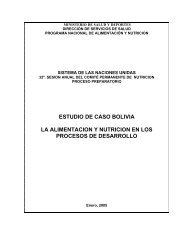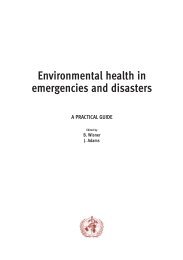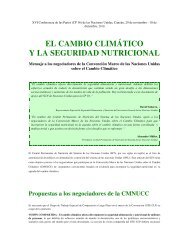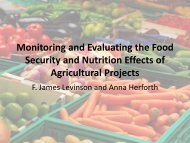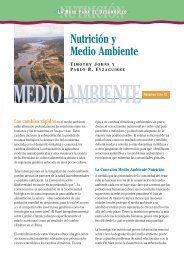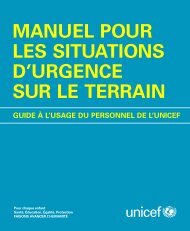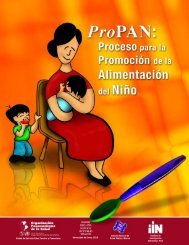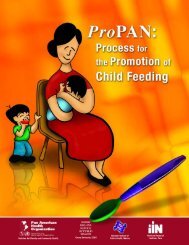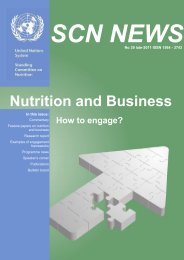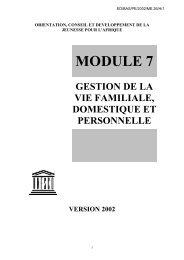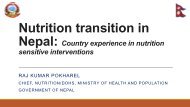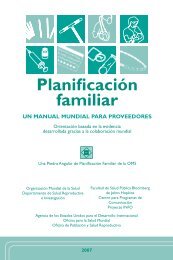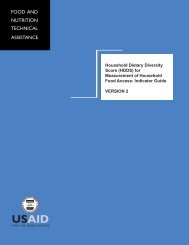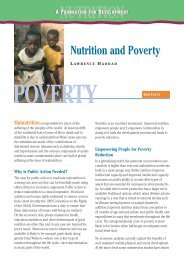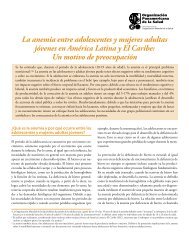SCN News No 36 - UNSCN
SCN News No 36 - UNSCN
SCN News No 36 - UNSCN
Create successful ePaper yourself
Turn your PDF publications into a flip-book with our unique Google optimized e-Paper software.
60<br />
WORKING GROUPS<br />
www.unsystem.org/scn<br />
WORKING GROUP ON CAPACITY DEVELOPMENT IN FOOD AND NUTRITION<br />
Chair: Patrick Stover (UNU), Co-Chairs: David Sanders (Univ. of the Western Cape, SA), Emorn Wasantwisut (Mahidol University, Thailand)<br />
Topics discussed<br />
• Current state of academic and research<br />
institutions in developing regions,<br />
and the need to strengthen<br />
their capacity and sustainability<br />
• Universities’ role in addressing regional<br />
public health nutrition needs<br />
• Lancet Nutrition Series<br />
Working Group mission<br />
The WG’s focused mission, as part of<br />
UNU-FNP, remains unchanged and is<br />
expressed through three goals<br />
1) to assist developing regions enhance<br />
individual, organizational<br />
and institutional capacity in the<br />
area of food and nutrition<br />
2) to undertake research activities<br />
that require global efforts<br />
3) to serve as the academic arm for<br />
the UN System in areas of food<br />
and nutrition that are best addressed<br />
in a non-regulatory, nonnormative<br />
environment.<br />
Recommendations (extract)<br />
• Conduct and publish a comprehensive<br />
review of graduate training<br />
in international nutrition, including<br />
recommendations for curriculum<br />
and cost/benefit analysis of education<br />
in regional versus western universities<br />
• Strengthen south-south collaborations<br />
among training and research<br />
institutions<br />
• Renew efforts towards north-south<br />
collaborations among training and<br />
research institutions<br />
• For countries without nutrition training<br />
institutions, UNU can facilitate<br />
the training of their staff by linking<br />
them with well established nutrition<br />
training institutions in the region<br />
Planned Activities 2008-2009<br />
UNU-FNP Task Forces’ planned<br />
activities are described in the report<br />
For more details please see Working<br />
Group report and presentations at the<br />
<strong>SCN</strong> Session<br />
<strong>SCN</strong> NEWS # <strong>36</strong> back to contents<br />
Presentations and discussions 5 March<br />
Patrick Stover gave a brief update on the United Nations University Food and<br />
Nutrition Programme for Human and Social Development (UNU-FNP), and<br />
explained that <strong>SCN</strong> Capacity Development focuses on Research, Training,<br />
Networking and Advocacy, in particular through Regional Networks of<br />
Universities, Institutes and Research Centers.<br />
Anna Lartey (University of Ghana) gave a presentation on Strengthening<br />
capacity in academic institutions & institutionalizing these efforts for<br />
sustainable faculty and research programs<br />
Arne Oshaug (Akershus University College, <strong>No</strong>rway) gave a presentation on<br />
Strengthening capacity in academic institutions to serve regional local<br />
food and nutrition programmes (training, monitoring, evaluation,<br />
programme research) for improving public health<br />
Osman Galal (IUNS) presented the Strategic plan for engagement: the<br />
academic network in the Middle East<br />
Comments were given by a UNU-FNP panel (Mirjana Pavlovic,University of<br />
Belgrade; Emorn Wasantwisut, University of Mahidol, Thailand; Azza Gohar<br />
National Nutrition Institute, Cairo; Joseph Ashong, Cornell University, AGSNet)<br />
Conclusions on the state of academic and research institutions in<br />
developing regions and the role of universities: Within universities, the<br />
retention of young faculty is increasingly a challenge due to low salaries,<br />
deteriorating infrastructure, inadequate resources to conduct research, and<br />
increased teaching obligations. <strong>No</strong>rth-South collaborations among universities<br />
can be effective in training new faculty and providing resources to seed<br />
research programs for young faculty. Universities play a key role in addressing<br />
local public health needs in the areas of program research, monitoring,<br />
evaluation and training. The importance of integrating context, interdisciplinary<br />
approaches, qualitative & quantitative methodologies, project/programme<br />
cycle, globalization, transitions, policy developments and governance was<br />
emphasized. An assessment of current practices in program research,<br />
monitoring, evaluation and training indicates gaps in addressing many of these<br />
key parameters. The group also recognizes the importance of south-south<br />
collaborations in informing and enhancing nutrition training.<br />
Comments to the Lancet Nutrition Series: The overall sentiment of the discussion<br />
reflected the conclusions reached in the LNS regarding training and institutional<br />
capacities. There was general agreement that there is a shortage of<br />
appropriately trained academics, professionals and technicians in nutrition, and<br />
that current nutrition training and education at all levels does not adequately prepare<br />
new graduates for careers in nutrition. Current approaches to training were<br />
described as “outdated”, “irrelevant”, and not regionally informed with a western<br />
bias. There was less agreement in the WG regarding the value of educating students<br />
from developing regions in American and European universities.<br />
Some useful websites:<br />
• United Nations University Food and Nutrition Programme for Human and Social Development<br />
(UNU-FNP) www.unu.edu/capacitybuilding/foodnutrition/pg.html<br />
• Asian Capacity Building Initiative: Capacity Strengthening In Nutrition-Asia (CASNA)<br />
www.casna.net<br />
• Middle East and <strong>No</strong>rth African Nutrition Capacity Building Initiative (MENANA)<br />
www.menana.net<br />
• Network for Capacity Development in Nutrition Central and Eastern Europe<br />
(NCDNCEE) www.agrowebcee.net/subnetwork/ncdn<br />
• African Graduate Student Network (AGSNet)<br />
www.unu.edu/capacitybuilding/foodnutrition/agsnet<br />
• African Nutrition Leadership Programme (ANLP) www.africanutritionleadership.org



